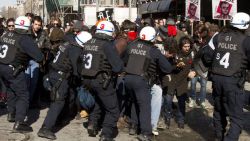Coop média de Montréal
Journalisme indépendant
Criminalizing Dissent
In a so-called peaceful society – you are meant to follow orders. You are meant to remain silent. To the extent that political organizing is permitted, it must remain benign. Charity is embraced; solidarity is scorned.
The primary function of our major institutions is to insure that the mass of people remain passive, obedient and subservient. And when this social peace is disturbed—as we are doing right now on a significant scale in Quebec—these same powerful institutions begin to show their teeth.
It is only when you disturb this system in a significant way that the overwhelming power of state capitalism becomes readily apparent. We have moved from a system of subtle coercion to a system of outright propaganda, fear and police oppression.
There is no more urgent task today than to disturb the so-called peace. In fact, it is really this enforced peace that is disturbing.
And when you challenge the system, the course of events is very similar. The first thing that happens is the system has to be disrupted. And by disrupting the system, you actually have to create a blockage in the regular flow of capital.
So in Quebec, for example, as the strike entered its third or fourth week, a large business council called on the provincial government to resolve the strike, not out of moral principle, but because they were concerned that there would not be enough cheap student labour to fill all of the temporary summer jobs, primarily in the tourism industry. So there is one blockage.
And once you disrupt the system, a number of things happen. All of the powerful institutions use their overwhelming influence and power to try and supress the disruption and enforce social order again, or so-called peace.
In order to do so, a segment of the population must be demonized and dehumanized. This is usually the most disruptive segment of the population.
People are depicted as violent, criminal, foreign, unnecessary or somehow illegitimate. The state and corporate media does an excellent job of fostering this kind of propaganda.
This does serve a few useful functions. First, it instils fear in the population, which serves several useful functions: fear acts as a deterrent, discouraging people from engaging in political activity and civil disobedience. Fear also turns people to embrace authority and social order.
So in Quebec, for example, a columnist in La Presse stated that a strong leader was necessary to deal with the student movement, with all its totalitarian undertones.
When a segment of the population is dehumanized and a climate of fear is created, it becomes that much easier to oppress and brutalize individuals or groups of people.
In Quebec, emergency provincial legislation (law 78) is under debate which threatens people with fines and potential criminal charges for assembling without providing police with the itinerary and route of a protest in advance.
The level of surveillance and oppression is unparalleled in recent North American history. The city of Montreal has literally become para-militarized, yet it is deemed permissible and even applauded precisely because protestors are deemed illegitimate and subhuman.
Crushing a movement without addressing its root concerns are only likely to create a sense of bitterness that will emerge again. So while it is impossible to predict future events, all of these trends will likely emerge with increasing frequency across the world.
In other words, increasing polarization of society, stronger appeals to authority and power, sharp nationalist appeals, jingoism, criminalization of dissent, the normalization of police brutality and dehumanization of segments of the population—ranging from immigrants and refugees to students and unions. This is all in the context of a system of neoliberal capitalism trying to sustain itself after the worst global crisis since the Great Depression.
These are all very disturbing trends and there is no easy way of resolving them. A few critical elements of resistance, however, are friendship, creativity, care, pleasure, mutual-aid and above all, solidarity.
Matthew Brett is a writer and student based in Montreal. Segments of this text are drawn from a lecture delivered at the Edufactory conference in Toronto, April 27-29, 2012.
About the poster
Matthew Brett (Matthew Brett)
Montreal, Quebec
Member since May 2011
About:
Matt Brett is an anarchist, activist, writer and assistant publisher at Canadian Dimension magazine.The site for the Montreal local of The Media Co-op has been archived and will no longer be updated. Please visit the main Media Co-op website to learn more about the organization.




